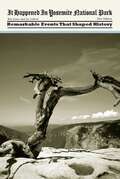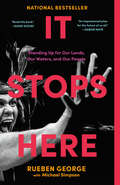- Table View
- List View
It Happened In Rocky Mountain National Park: Stories of Events and People that Shaped a National Park (It Happened In Series)
by Phyllis J. PerryFrom an out-of-control wildfire that nearly destroyed a town to a serial spouse killer in Estes Park, It Happened in Rocky Mountain National Park looks at intriguing people and episodes from the history of Colorado&’s largest national park.Learn how two teens&’ attempt to scale the Diamond—a sheer granite cliff so dangerous that climbing it used to be outlawed—resulted in one of the most complicated rescues in the park&’s history. Read about the life and untimely demise of Rocky Mountain Jim, who was badly scarred by a grizzly bear attack and earned a reputation as an eccentric but highly skilled wilderness guide. And meet Harriet Peters, an unusually tenacious girl who summited 14,259-foot-tall Longs Peak at the tender age of eight.
It Happened in Glacier National Park (It Happened In Series)
by Vince MoravekIt Happened in Glacier National Park takes readers on a rollicking, behind-the-scenes look at some of the characters and episodes from the Park's storied past. Including both famous tales, and famous names--and little-known heroes, heroines, and happenings.
It Happened in Yellowstone: Remarkable Events That Shaped History (It Happened In Series)
by Erin H. TurnerThis book offers an inside look at over 30 interesting and unusual episodes that shaped the history of Yellowstone Park. Read about the making of "Wonderland" over 600,000 years ago. Try to piece together the Great Stagecoach Robbery of 1908. Discover why fishing at Fishing Bridge has been banned since 1973.
It Happened in Yellowstone: Stories of Events and People That Shaped America's First National Park (It Happened In Series)
by Erin H. TurnerTrue Tales from Yellowstone&’s Past—from the volcanic eruption that formed its landscape to the great fires of 1988Waterfalls, mountains, trees, geysers, and magnificent wildlife form the backdrop for the first national park&’s lively history. It Happened in Yellowstone goes behind the scenes to tell its story, in short episodes that reveal the intriguing people and events that have shaped Geyserland. • Experience Truman Everts&’s harrowing thirty-seven day struggle to survive alone in the landscape in 1870. • Learn about the historic flight of the Nez Perce and their encounter with early Yellowstone tourists. • Feel the earth shake as it did in 1959 when Quake Lake was formed in a massive earthquake. • Glimpse grizzlies and wolves as these wild creatures find a way to survive in a changing ecosystem.
It Happened in Yosemite National Park: Remarkable Events That Shaped History (It Happened In Series)
by Ray JonesTwenty to thirty episodes from the history of Yosemite National Park, including memorable events, but also featuring lesser-known tales.
It Happened in the Great Smokies: Stories of Events and People that Shaped a National Park (It Happened In Series)
by Michael R. BradleyFrom an eighteenth-century Cherokee feast to a deadly wildfire that destroyed a town, It Happened in the Great Smokies looks at intriguing people and episodes from the history of America&’s most visited national park. It Happened in the Great Smokies includes thirty-one fascinating stories about events and ten biographies of people that shaped this famous national park in the states of North Carolina and Tennessee.
It Stops Here: Standing Up for Our Lands, Our Waters, and Our People
by Michael Simpson Rueben GeorgeA personal account of one man&’s confrontation with colonization that illuminates the philosophy and values of a First Nation on the front lines of the fight against an extractive industry, colonial government, and threats to the life-giving Salish Sea.It Stops Here is the profound story of the spiritual, cultural, and political resurgence of a nation taking action to reclaim their lands, waters, law, and food systems in the face of colonization. In deeply moving testimony, it recounts the intergenerational struggle of the Tsleil-Waututh Nation to overcome colonial harms and the powerful stance they have taken alongside allies and other Indigenous nations across Turtle Island against the development of the Trans Mountain Pipeline—a fossil fuel megaproject on their unceded territories.In a firsthand account of the resurgence told by Rueben George, one of the most prominent leaders of the widespread opposition to the Trans Mountain Pipeline expansion, It Stops Here reveals extraordinary insights and revelations from someone who has devoted more than a decade of his life to fighting the project. Rueben shares stories about his family&’s deep ancestral connections to their unceded lands and waters, which are today more commonly known as Vancouver, British Columbia and the Burrard Inlet. He discloses how, following the systematic cultural genocide enacted by the colonial state, key leaders of his community, such as his grandfather, Chief Dan George, always taught the younger generations to be proud of who they were and to remember the importance of their connection to the inlet.Part memoir, part call to action, It Stops Here is a compelling appeal to prioritize the sacred over oil and extractive industries, while insisting that settler society honour Indigenous law and jurisdiction over unceded territories rather than exploiting lands and reducing them to their natural resources.
It's All Connected: A Comprehensive Guide to Global Issus and Sustainable Solutions Facing the Future
by Benjamin Wheeler Gilda Wheeler Wendy ChurchIt's All Connected provides a thorough overview of a full range of global issues, as well as in-depth explorations of particular-topics, debates, and solutions. Each unit contains thematically related chapters. Unit 1 includes an introduction to global issues and sustainability as well as definitions for some important concepts. Units 2-6 address specific global issues, such as food, water, forests, oceans, poverty, culture, education, health, and conflict. The book concludes with a final unit on ideas and tools for addressing global issues, including a curriculum activity for students to study a particular global issue or region. Units can be read separately, sequentially, or in any order to fit particular curriculum needs.
It's Easy Being Green: A Handbook for Earth-Friendly Living
by Crissy TraskSurveys find that over 80 percent of Americans agree with the goals of the environmental movement. Sadly, most Americans admit to doing little more than basic recycling when it comes to acting on that disposition. What is the reason for this great divide between environmental sentiment in this country and individual actions? Author and environmental consultant Crissy Trask seeks to answer this question--and solve the disparity--with a new book that makes it easy to be an environmentalist, no matter how busy or hectic your lifestyle. This is a day to day guide with simple, practical suggestions that anyone can put into action.
It's Getting Hot in Here: The Past, Present, and Future of Climate Change
by Bridget HeosTackling the issue of global warming head-on for a teen audience, Bridget Heos examines the science behind it, the history of climate change on our planet, and the ways in which humans have affected the current crisis we face. It's Getting Hot in Here illustrates how interconnected we are not just with everyone else on the planet, but with the people who came before us and the ones who will inherit the planet after us. This eye-opening approach to one of today's most pressing issues focuses on the past human influences, the current state of affairs, the grim picture for the future--and how young readers can help to make a positive change.
It's Just a Plant: A Children's Story About Marijuana, Updated Edition
by Ricardo CortésA beautifully illustrated picture book that gives parents a way to discuss marijuana with children without encouraging them to use it. "It's Just a Plant follows the journey of a young girl named Jackie, who becomes curious about cannab
It's My Earth, Too
by Kathleen KrullIt's never too early to begin learning about the beauty and bounty of Planet Earth. And now with this bright and rhythmic tribute, young children will find out all the ways in which they, too, can help care for our planet.
It's Not Easy Being Green: One Family's Journey Towards Eco-friendly Living
by Dick StrawbridgeIt's Not Easy Being Green follows Dick Strawbridge and his family as they leave their comfortable home in the Midlands to tackle a remarkable self-sufficiency project - New House Farm in Cornwall. Their main objective is to have as little negative impact on the planet as possible by producing no waste and removing their dependency upon fossil fuels - all without compromising on their comfortable, modern 21st-century lifestyles. It's a laudable aim, but they are definitely not eco-warriors!With his hands-on, flamboyant approach, Dick offers practical tips on everything, from constructing water wheels, gadgets and greenhouses, to the trials of living with animals and knocking up 'proper' wholesome food. Packed with information about the cost of power, sourcing building materials, taking up permaculture and finding transport alternatives, It's Not Easy Being Green highlights the small steps that can change your life and is a simple, inspirational guide for everyone considering the path to green living.
It's Not Rocket Science
by Ben MillerThe Top Ten BestsellerBlack holes. DNA. The Large Hadron Collider. Ever had that sneaking feeling that you are missing out on some truly spectacular science? You do? Well, fear not, for help is at hand. Ben Miller was working on his Physics PhD at Cambridge when he accidentally became a comedian. But first love runs deep, and he has returned to his roots to share with you all his favourite bits of science. This is the stuff you really need to know, not only because it matters but because it will quite simply amaze and delight you. 'Let me show you another, perhaps less familiar side of Science; her beauty, her seductiveness and her passion. And let's do it quickly, while Maths isn't looking' - Ben Miller 'This book makes climate change actually seem interesting. Not just important - it's obviously important - but interesting. As a result I bought lots of other books about climate change, something I now regret'- David MitchellBen Miller is, like you, a mutant ape living through an Ice Age on a ball of molten iron, orbiting a supermassive black hole. He is also an actor, comedian and approximately one half of Armstrong & Miller. He's presented a BBC Horizon documentary on temperature and a Radio 4 series about the history of particle physics, and has written a science column for The Times. He is slowly coming to terms with the idea that he may never be an astronaut.
It's Not Rocket Science
by Ben MillerThe Top Ten BestsellerBlack holes. DNA. The Large Hadron Collider. Ever had that sneaking feeling that you are missing out on some truly spectacular science? You do? Well, fear not, for help is at hand.Ben Miller was working on his Physics PhD at Cambridge when he accidentally became a comedian. But first love runs deep, and he has returned to his roots to share with you all his favourite bits of science. This is the stuff you really need to know, not only because it matters but because it will quite simply amaze and delight you.'Let me show you another, perhaps less familiar side of Science; her beauty, her seductiveness and her passion. And let's do it quickly, while Maths isn't looking' - Ben Miller'This book makes climate change actually seem interesting. Not just important - it's obviously important - but interesting. As a result I bought lots of other books about climate change, something I now regret'- David MitchellBen Miller is, like you, a mutant ape living through an Ice Age on a ball of molten iron, orbiting a supermassive black hole. He is also an actor, comedian and approximately one half of Armstrong & Miller. He's presented a BBC Horizon documentary on temperature and a Radio 4 series about the history of particle physics, and has written a science column for The Times.He is slowly coming to terms with the idea that he may never be an astronaut.
It's Raining, It's Pouring (The Adventures of Sophie Mouse #10)
by Poppy GreenSophie Mouse and her furry friends prepare for a big storm that’s headed right for Silverlake Forest in this tenth charming book of The Adventures of Sophie Mouse series!Sophie Mouse has been preparing for the first-ever Silverlake Forest Spring Fling for weeks. She has come up with activities, like a Lily Pad Dance, she’s thought of games to play, and she’s created all sorts of fun hats, masks, and other costumes for her friends to wear. But the day of the Spring Fling is approaching, and Sophie’s twitching whiskers are telling her that the rain is too! Sure enough, it rains and it pours. Will Sophie figure out a way to save the day or will all her hard work go to down the drain? With easy-to-read language and illustrations on almost every page, the Adventures of Sophie Mouse chapter books are perfect for beginning readers.
It's Spring! (DreamWorks Trolls)
by Mary Man-KongThe characters from DreamWorks Trolls celebrate spring in a brand-new board book!Poppy, Branch, and Cloud Guy celebrate their favorite parts of spring--from flowers to rainbows and more--in this all-new Trolls board book! Boys and girls 0 to 3 will love the exciting full-color illustrations!
It's Winter
by Linda GlaserSimple text and bold, beautiful paper sculpture convey the animal life, plant life, weather, and clothing, as well as the colors and feelings, associated with the winter season. Nature activities to do in the winter are included.
It's Your World: Get Informed, Get Inspired And Get Going!
by Chelsea ClintonGet Informed! Get Inspired! Get Going!In a book that tackles the biggest challenges facing us today, Chelsea Clinton combines facts, charts, photographs and stories to give readers a deep understanding of the world around them--and how anyone can make a difference. With stories about children and teens who have made real changes big and small--in their families, their communities, in our country and across the world--this book will inspire readers of all ages to do their part to make our world a better place.In addition to informing and inspiring readers about topics including Poverty, Homelessness, Food Insecurity, Access to Education, Gender Equality, Epidemics, Non-Communicable Diseases, Climate Change, and Endangered Species, this book encourages everyone to get going! With suggestions and ideas for action, Chelsea Clinton shows readers that the world belongs to every single one of us, and every one of us counts.You can make a difference. You can make a change. It's your world.From the Hardcover edition.
It's a Jungle Out There!: 52 Nature Adventures for City Kids
by Jennifer WardJust because you live in the city doesn't mean you can't enjoy nature. This compact guide offers 52 nature-focused explorations, adventures, observations, and games that can help you and your child connect to nature while living in the city. While it may be hard to see nature through the traffic, buildings, and busyness of the city, there is still much of the natural world to explore when you turn your gaze to the cracks in the sidewalk, the trees on the street, or the green spaces that your city offers. Become an urban birder, make your own man vs. wild observations, and discover the not-so-hidden pockets of nature in your neighborhood. For children ages 4 to 8. Jennifer Ward is the author of I Love Dirt!, Let's Go Outside!, and numerous children's books, all of which present nature to kids. Learn more about her at jenniferwardbooks.com.
It's a Jungle Up There: More Tales from the Treetops
by Margaret D. Lowman Edward Burgess James Burgess Ghillean T. PranceDrawn to the mysteries of tropical rain forests and fascinated by life in the treetops, Meg Lowman has pursued a life of scientific exploration while raising her two sons, Edward and James Burgess. This book recounts their family adventures in remote parts of the world (Samoa, West Africa, Peru, Panama, India, Biosphere 2, and others), from the perspectives of both kids and parent. Together they explore tropical rain forests, encounter anacondas and piranhas, eat crickets as hors d'oeuvres, discover new species, and nurture a family ethic for conservation. The chapters of the book focus on field biology questions, the canopy access methods developed to answer the questions, and conservation or education components of each expedition. Lowman enumerates the challenges and joys of juggling parenthood and career, and the children reflect on how their mom's work has affected their lives. A rollicking, inspiring book,It's a Jungle Up There is an upbeat portrayal of how a parent's career can imprint children, and how children in turn can influence the success and trajectory of their parent's career.
It's a Wonderful World: How to Protect the Planet and Change the Future (Protect the Planet)
by Jess FrenchOur world is wonderful, and it&’s up to us to take care of it. You may feel small, but your actions can make a big difference. This title encourages children to take care of the planet, but it doesn&’t just focus on the problems—it teaches them proper practical solutions to the issues facing our world today. Veterinarian, author, and TV host Jess French guides kids through taking care of our planet, from living a sustainable lifestyle to using their voice in politics. Unlike many books about the environment, Jess not only covers how to take care of plants and animals, but also the positive contribution that humans can make on each other&’s lives, too. Strong themes of self-care and mindfulness run through the book, and kids are introduced to activism. Discover how to reduce your carbon footprint, understand the importance of preserving our forests, oceans, and endangered animals, and learn the best ways to stand up for what you believe in. Bright, cool illustrations by Aleesha Nandhra combine with photography to create vibrant, engaging spreads, and Jess French&’s encouraging and instructive text empowers kids to look after the environment, themselves, and each other. What a Wonderful World is the perfect book to show children that being kind to each other and working together is the best way to start protecting the planet.
It's the Crude, Dude: Greed, Gas, War, and the American Way
by Linda McQuaigGeorge W. Bush says he invaded Iraq to bring democracy to the Middle East. Some people believe that. But if you have nagging doubts, you'll be intrigued by the story unraveled in It's the Crude, Dude.With all the drama of a thriller, Canadian bestselling author Linda McQuaig probes the mystery of what really lay behind the U.S. invasion of Iraq. She points to Washington's desire to gain control of the most spectacular untapped oil bonanza on Earth--even as rapidly dwindling worldwide oil reserserves threaten to turn competition for crude into the major international battleground of the future.That battle has actually been raging for decades. Once tightly controlled by Big Oil, most of the world's oil reserves have been taken over by nationalistic regimes in the Middle East. Ever since those regimes imposed an oil embargo on the United States in the mid-1970s, Washington has been determined to regain control over oil--by force if necessary. With China's recent emergence as a voracious oil consumer, there soon won't be enough oil left to fuel two superpowers.Against this backdrop--and the equally urgent problem of global warming--It's the Crude, Dude reminds us of the enormous consequences of our failure to curb our addiction to oil.























